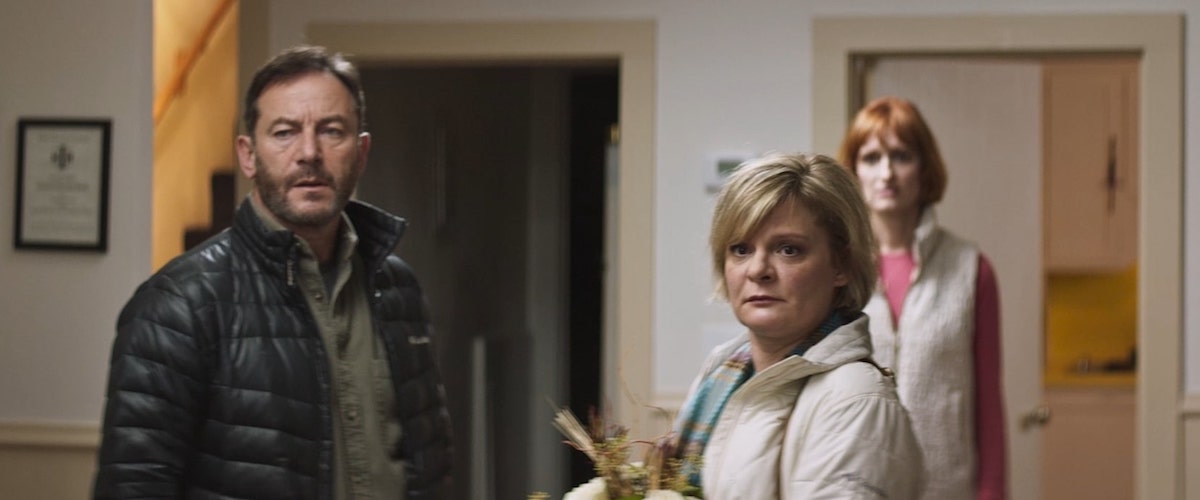
An out-of-nowhere triumph, "Mass" is the sort of American drama that you rarely see anymore: an intimate four-character piece about the aftermath of a school shooting that unfolds mostly in one room, letting a powerhouse cast and a thoughtful script carry much of the burden of meaning.
Martha Plimpton and Jason Isaacs play the parents of a teenage boy who was one of ten students murdered in a school shooting. Ann Dowd and Reed Birney are the parents of the killer, a depressed and disturbed young man. The couples agree to sit at a table in the basement of an Episcopalian church and talk about, well, everything, in hopes of moving past depression, grief and anger, through catharsis, and toward a state of acceptance, or at least insight.
There's a brief setup featuring Michelle N. Carter as the social worker handling the details of the meeting, and Breeda Wool as a woman who works at the church, and is helpful to the point of being unnerving, but the vast majority of the film consists of the four main characters doing the hard work of confronting the unspeakable. The results are never less than riveting, and there are multiple moments—democratically distributed among the four leads—that are as good as screen acting can get.
Although "Mass" is an original work written for the screen by its director, actor Fran Kranz —in his feature filmmaking debut—it has the feel of a stage play or live TV drama that was subsequently adapted for the big screen, during an era when people would happily pay to see theatrical films about adults in the real world, dealing with life-changing events that could actually happen. Film buffs may be reminded of such claustrophobic stage-to-screen classics as "Days of Wine and Roses," "Marty," " 12 Angry Men ," "Vanya on 42 St." and " Glengarry Glen Ross ." The film's excellence in every department earns these comparisons.
From the moment that Plimpton and Isaacs's characters, Jay and Gail, arrive at the church, tension starts coiling up, and you just know that when it's finally released, it'll be something to see. Plimpton, a 1980s youth star whose character actor phase has been consistently fascinating, captures the buried rage of a mom whose agony over losing a son in an act of obscene violence was magnified by the frustration of seeing the parents of the perpetrator protect themselves from legal and financial blame on the advice of legal counsel. From the second that she appears onscreen, you expect her to explode at some point; her exasperated and openly hostile expressions as the other couple obfuscates, minimizes, qualifies and otherwise tries to tamp down the tension in the room are all little masterpieces of reactive acting. Isaacs, however, catches up with Plimpton, as we start to discern that, even though Jay carries himself as a "voice of reason"-type who has done the right reading and consulted the right experts and thinks of himself as a mediator between his wife and the rest of the world, he's sitting on a megaton of anger himself.
Dowd's Linda and Birney's Richard initially come across as representatives of a specific type of middle American suburbanite, with a placid, peaceful-yet-resolute demeanor that reads as conciliatory and sensitive but that pretty soon starts to seem condescending and self-protecting. You see their vibe rather often among reactionaries who've figured out how to come across as presentable when dealing with people outside of the tribe.
Richard, the only character dressed formally, warns Jay and Gail at the top of their meeting that he has somewhere to be, and spends much of the first third of the sit-down seeming as if his main goal is to deflect blame from himself and his wife. He keeps reminding the others that this is a complicated situation and that the tragedy has many possible causes, that it's not possible to reduce it to any one problem, and soon enough you're rolling your eyes along with Gail, because it seems as if Richard has come to this meeting with a bad faith attitude, and cares mainly about not saying or doing anything actionable (even though both couples signed papers stating that they wouldn't use anything said in that room for legal purposes).
Richard's actually not wrong—a school shooting is a multifaceted horror that can't be reduced to any one thing. Parents will likely be made increasingly uncomfortable by the film's insistence that some things in life are mysterious and immune to simple explanation, and that even good mothers and fathers (all four characters here fit the description) can let certain things slide without realizing how they can snowball and eventually lead to indescribable misery and violence.
But does that necessarily mean that school shootings are, in some sense, an inexplicable cosmic occurrence, an "Act of God" like a flood or avalanche? Even floods and avalanches have human causes, as we're increasingly starting to understand and admit.
It turns out that the movie has decided to sidestep or minimize some of the more explosive political and cultural issues that tend to be at the center of incidents like these in the United States, gun ownership and gun control being a huge one. Linda and Richard apparently don't own firearms themselves, and it's explained that their son, a prototypical bullied loner who was nonspecifically radicalized online, stole them from the father of a friend. Nor is there any talk of the respective politics of the couples.
This seems like a case where the filmmaker has decided to trade one kind of storytelling problem for another. You can't discuss mass shootings in the United States—quite literally the only supposedly civilized country where these things happen several times a week for years on end—without discussing the gun lobby, the mass opposition to any kind of meaningful gun regulations, and lots of related issues. Richard's early invocation of his son's mental health seems as if it's going to lead to talk of how gun culture uses mental health as a red herring to deflect attention away from the necessity of gun control (as Jay observes, a tragedy can have more than one cause; it's interesting that Richard himself said this before Jay did).
But "Mass" seems unwilling to get too deep in the weeds when it comes to topics like these, as it would distract from the human drama, and the film isn't wrong to believe this; had the movie become a policy discussion using characters as mouthpieces, a la the worst of Aaron Sorkin , it wouldn't be nearly as moving as it is.
It's hard to convey in words the kind of visual excitement that comes from watching a piece anchored by four skilled, magnetic character actors who look like the sorts of people you might actually meet in life. Even the performer who comes closest to having a matinee-idol look, Isaacs, isn't a ridiculous, 'roided-up action figure, of the type that tends to anchor 21st century commercial films; with his sad eyes, grief-sunken face, and week's worth of facial scruff, he has the look of a middle-aged suburban man who runs a couple of miles a day, and who everyone agrees is the most handsome of all the dads.
These actors feel real in a way that movie characters rarely do, and Kranz shows that he has an instinctive feel for staging dialogue cinematically, making mostly subtle yet decisive and meaningful directorial choices (such as switching from locked-down, steady images to rough handheld shots, and changing the shape of the screen itself) while always letting the cast's in-the-moment decisions pull the story along.
This is a difficult movie to sit through, not just because of the subject matter, but because it's so honest in dramatizing how people process tragedy and carry it through life.
Now playing in select theaters.
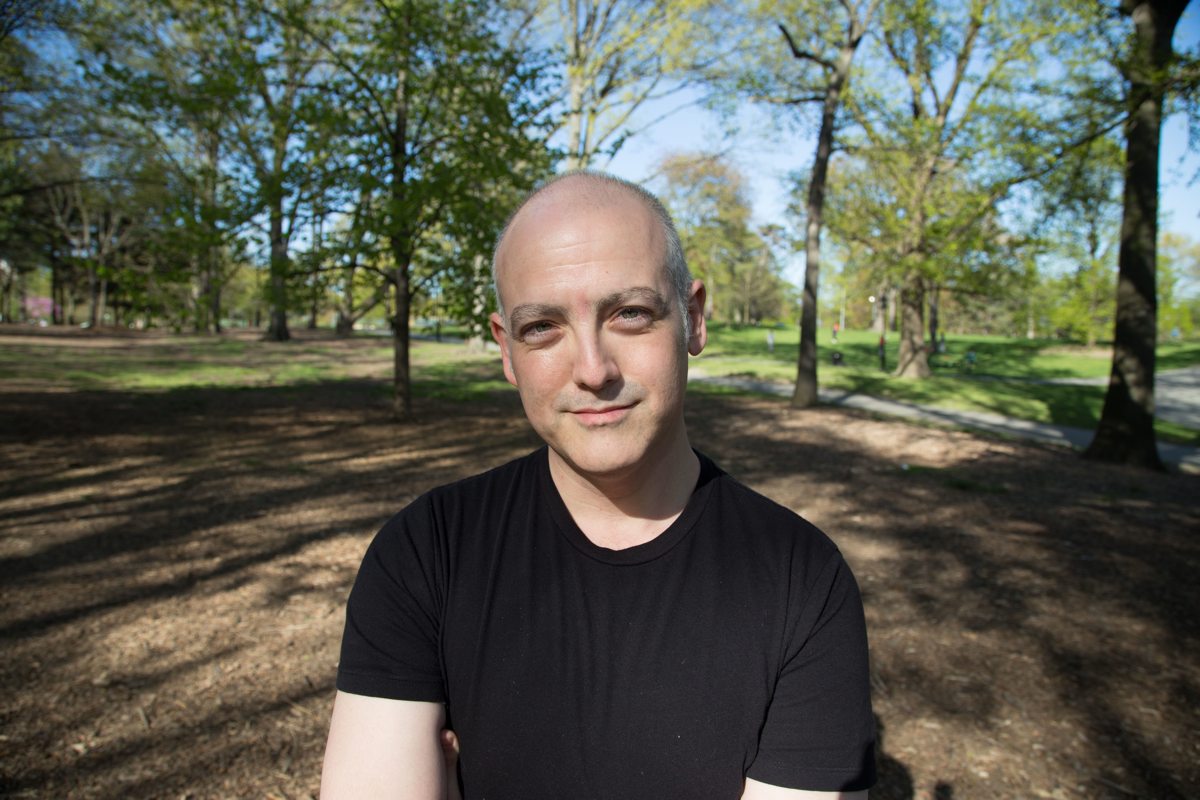

Matt Zoller Seitz
Matt Zoller Seitz is the Editor-at-Large of RogerEbert.com, TV critic for New York Magazine and Vulture.com, and a finalist for the Pulitzer Prize in criticism.
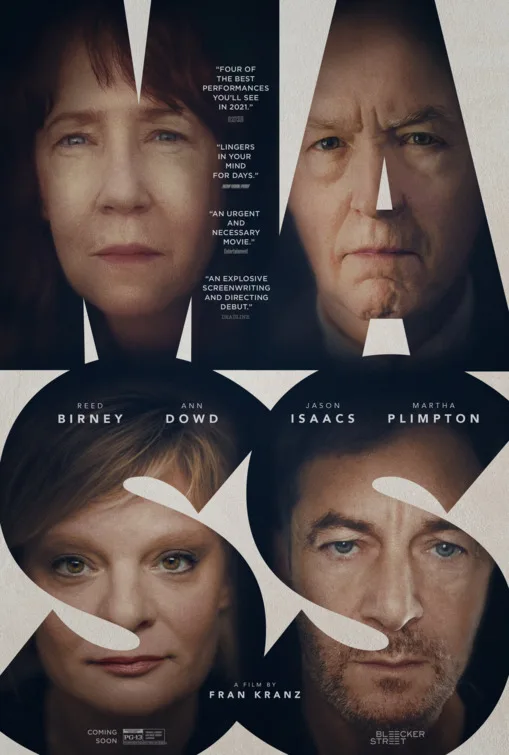
- Jason Isaacs as Jay
- Reed Birney as Richard
- Martha Plimpton as Gail
- Ann Dowd as Linda
- Breeda Wool as Judy
- Kagen Albright as Anthony
- Darren Morze
Cinematographer
- Ryan Jackson-Healy
- Yang Hua Hu
Leave a comment
Now playing.

All We Imagine as Light

Elton John: Never Too Late

The Creep Tapes

Small Things Like These

Bird (2024)

Meanwhile on Earth

Christmas Eve in Miller's Point

Stockholm Bloodbath

Latest articles
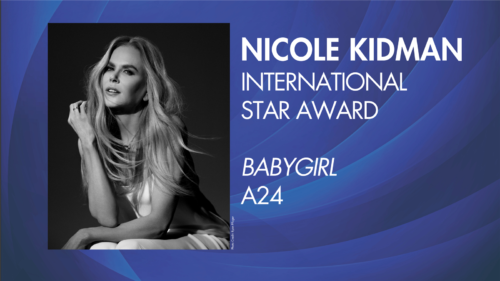
Nicole Kidman Joins Honorees at Palm Springs International Film Festival

Jimmy O. Yang Shines in Excellent "Interior Chinatown"

Tokyo International Film Festival 2024: "Apollon by Day, Athena by Night," "Underground," "Emmanuelle"

Taylor Sheridan's Well Runs Dry in "Landman"
The best movie reviews, in your inbox.
We sent an email to [email protected]
Didn't you get the email?
By joining, you agree to the Terms and Policies and Privacy Policy and to receive email from the Fandango Media Brands .
User 8 or more characters with a number and a lowercase letter. No spaces.
username@email
By continuing, you agree to the Privacy Policy and the Terms and Policies , and to receive email from the Fandango Media Brands .
Log in or sign up for Rotten Tomatoes
Trouble logging in?
By creating an account, you agree to the Privacy Policy and the Terms and Policies , and to receive email from Rotten Tomatoes and to receive email from the Fandango Media Brands .
By creating an account, you agree to the Privacy Policy and the Terms and Policies , and to receive email from Rotten Tomatoes.
Email not verified
Let's keep in touch.

Sign up for the Rotten Tomatoes newsletter to get weekly updates on:
- Upcoming Movies and TV shows
- Rotten Tomatoes Podcast
- Media News + More
By clicking "Sign Me Up," you are agreeing to receive occasional emails and communications from Fandango Media (Fandango, Vudu, and Rotten Tomatoes) and consenting to Fandango's Privacy Policy and Terms and Policies . Please allow 10 business days for your account to reflect your preferences.
OK, got it!
- About Rotten Tomatoes®
- Login/signup
Movies in theaters
- Opening This Week
- Top Box Office
- Coming Soon to Theaters
- Certified Fresh Movies
Movies at Home
- Fandango at Home
- Prime Video
- Most Popular Streaming Movies
- What to Watch New
Certified fresh picks
- 80% Emilia Pérez Link to Emilia Pérez
- 96% A Real Pain Link to A Real Pain
- 100% All We Imagine as Light Link to All We Imagine as Light
New TV Tonight
- 71% Dune: Prophecy: Season 1
- 71% Landman: Season 1
- 80% Interior Chinatown: Season 1
- -- Based On A True Story: Season 2
- -- The Sex Lives of College Girls: Season 3
- 100% Outlander: Season 7
- -- A Man on the Inside: Season 1
- -- Cruel Intentions: Season 1
- -- Our Oceans: Season 1
- -- Making Manson: Season 1
Most Popular TV on RT
- 93% Say Nothing: Season 1
- 95% The Penguin: Season 1
- 82% The Day of the Jackal: Season 1
- 76% Cross: Season 1
- 100% Arcane: League of Legends: Season 2
- 95% Silo: Season 2
- 81% Bad Sisters: Season 2
- 77% Disclaimer: Season 1
- 95% The Diplomat: Season 2
- Best TV Shows
- Most Popular TV
Certified fresh pick
- 93% Say Nothing: Season 1 Link to Say Nothing: Season 1
- All-Time Lists
- Binge Guide
- Comics on TV
- Five Favorite Films
- Video Interviews
- Weekend Box Office
- Weekly Ketchup
- What to Watch
All 73 Disney Animated Movies Ranked
Dwayne Johnson Movies Ranked by Tomatometer
What to Watch: In Theaters and On Streaming.
Awards Tour
Movie Re-Release Calendar 2024 & 2025: Your Guide to Movies Back In Theaters
‘Seen on the Screen’ Podcast: A Celebration of Universal Stories
- Trending on RT
- Gladiator II First Reviews
- Holiday Programming
- Movie Re-Release Calendar
- Verified Hot Movies
Where to Watch
Watch Mass with a subscription on Hulu, rent on Fandango at Home, Prime Video, Apple TV, or buy on Fandango at Home, Prime Video, Apple TV.
What to Know
Mass requires a lot of its audience, but rewards that emotional labor with a raw look at grief that establishes writer-director Fran Kranz as a filmmaker of tremendous promise.
Critics Reviews
Audience reviews, cast & crew.
Reed Birney
Jason Isaacs
Martha Plimpton
Breeda Wool
More Like This
Related movie news.
Advertisement
Supported by
‘Mass’ Review: Stages of Grief
Years after a school shooting, two couples meet to discuss their children — the one whose life was taken, and the one who took his life.
- Share full article

By Teo Bugbee
The couples at the heart of the chamber drama “Mass” have much in common. Each pair has two children, one living and one dead. And they share the same tragedy. Linda and Richard’s son, Hayden, killed Gail and Jay’s son, Evan, in a school shooting, before turning his gun on himself.
Years have passed, and now the couples have gathered in the back room of a church to discuss their children — the one who was taken, and the one who took. Gail (Martha Plimpton) and Jay (Jason Isaacs) initiated this meeting, and their goal is to uncover the facts that led to their child’s murder. Gail and Jay ask questions, and Linda (Ann Dowd) and Richard (Reed Birney) respond, recalling attempts to seek psychological help for their son, and the decisions that did not prevent his violence.
The writer and director Fran Kranz stages this congregation like a play. The actors are seated across from each other in a single room, and the camera work is minimal, alternating between close-ups. The dialogue limits the amount of knowledge the audience is given about how or why the central horror took place. This measured approach allows the feelings that flicker across the faces of the movie’s veteran cast to register not only as markers of marvelous acting — though there is plenty of that to spare — but as events with the power to propel the introspective plot.
The movie lacks the gut punch of live theater, the thrill or discomfort of watching people show their feelings in real time. But as cinema, it demonstrates the effectiveness of simplicity. A well-written script and an exemplary cast can still produce a movie worth watching.
Mass Rated PG-13 for references to violence. Running time: 1 hour 50 minutes. In theaters.
Explore More in TV and Movies
Not sure what to watch next we can help..
A Tearful Talk : Cynthia Erivo and Ariana Grande, the stars of the new movie “Wicked,” reflected on their long ride together , getting through Covid and the actors’ strike, and avoiding “playing to the green.”
Capturing America : As the wildly popular TV western “Yellowstone” prepares to air its final episodes, we look at four ways it seized the country’s attention .
Recreating War-Torn London : “Blitz,” Steve McQueen’s latest film, set in 1940 during Germany’s bombardment of the British capital, draws extensively from wartime photos .
Streaming Guides: If you are overwhelmed by the endless options, don’t despair — we put together the best offerings on Netflix , Max , Disney+ , Amazon Prime and Hulu to make choosing your next binge a little easier.
Watching Newsletter: Sign up to get recommendations on the best films and TV shows to stream and watch, delivered to your inbox.
Review: ‘Mass’ powerfully explores the emotional aftermath of a school shooting
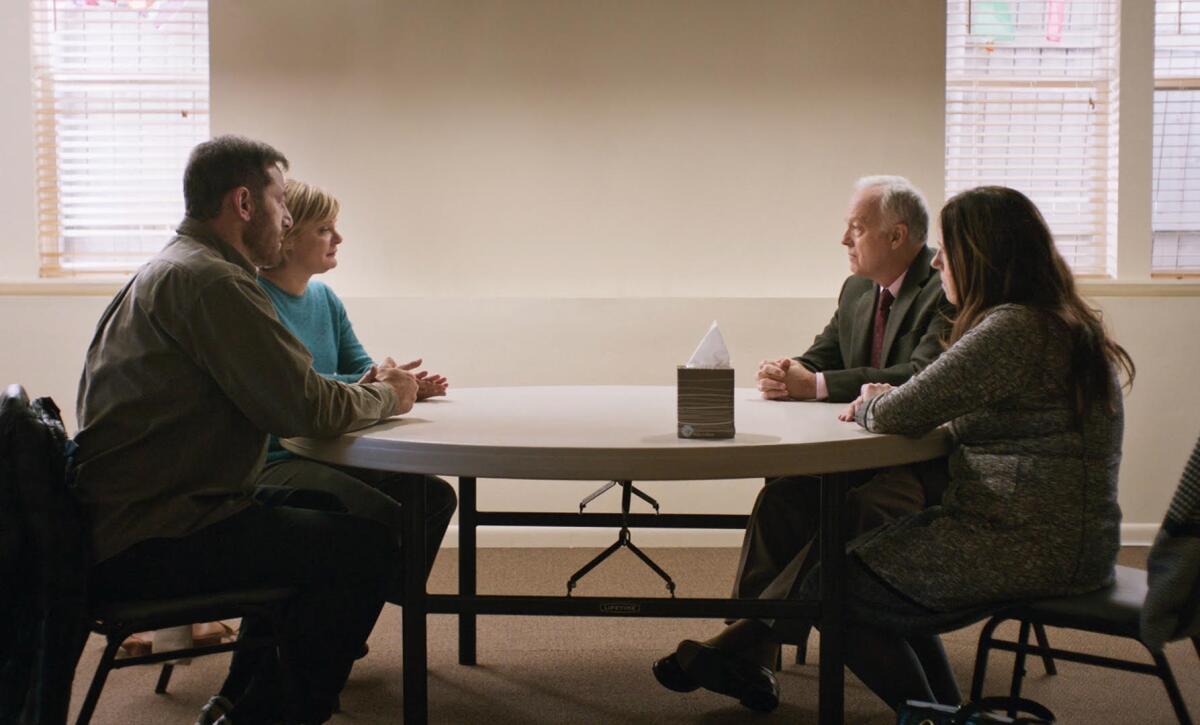
- Copy Link URL Copied!
The Times is committed to reviewing theatrical film releases during the COVID-19 pandemic . Because moviegoing carries risks during this time, we remind readers to follow health and safety guidelines as outlined by the Centers for Disease Control and Prevention and local health officials .
“Mass,” Fran Kranz’s somber, stirring writing-directing debut, unfolds over roughly two hours at a small-town church where two middle-aged couples gather for a private and intensely painful reckoning. The movie’s title evokes a religious service; not coincidentally, it also brings to mind a term that has been a depressing fixture of American headlines for decades (and surfaced again just this past week ). Several years earlier, we learn, these characters’ lives were shattered by a mass shooting at their children’s high school. Jay (Jason Isaacs) and Gail (Martha Plimpton) lost their son; Richard (Reed Birney) and Linda (Ann Dowd) also lost theirs, though as he was the shooter in question, they fear he was lost to them long before.
Or was he? The question of how a child becomes what he becomes — in this case, someone who murdered several other teenagers and then turned the gun on himself — hangs heavily over this movie’s tense silences, hard questions and anguished tears. So does the implicit accusation that Richard and Linda could have done something to stop him if only they’d been more attentive, proactive parents. Speculations about cause and questions of responsibility are always quick to materialize in the immediate aftermath of any real-life shooting; they also tend to haunt the movies made about them, including those, like Gus Van Sant’s “Elephant” and Denis Villeneuve’s “Polytechnique,” that dramatize their tragedies, moment by harrowing moment.
“Mass” has something different in mind, and not just because it takes place long after an eruption of violence that we are forced to imagine rather than witness. Kranz, a longtime actor making a startlingly assured shift into feature filmmaking, appears to have little interest in the tidy assignment of blame, though myriad possible causes — bad parents, school bullies, violent video games, easily accessible firearms — are summarily raised in passing. What fascinates the director, and clearly also fascinates his four outstanding lead actors, is the possibility of grace in a seemingly impossible, inconsolable situation. With considerable intelligence and disarming moral seriousness, they confront the question of whether forgiveness and understanding can be honestly extended or received, and whether healing can ever be more than an abstract concept.
Abstract concepts, of course, are the natural concern of every place of worship. So are a lot of basic practical logistics, and “Mass” takes care to ground its emotionally fraught story in the banality of the everyday. Shot primarily at Emmanuel Episcopal Church in Hailey, Idaho, the movie begins with a flurry of preparations in a back room: Chairs are set up, food is laid out and a tissue box is placed unobtrusively on a nearby table. A hard-working parishioner, Judy (Breeda Wool), is anxious to show her guests warmth and hospitality, but Kendra (Michelle N. Carter), the no-nonsense parents’ representative who arranged the meeting, makes clear that all they need is quiet and privacy. This literal setting of the scene creates a heightened level of anticipation and intimacy that kicks up a notch once the parents arrive.
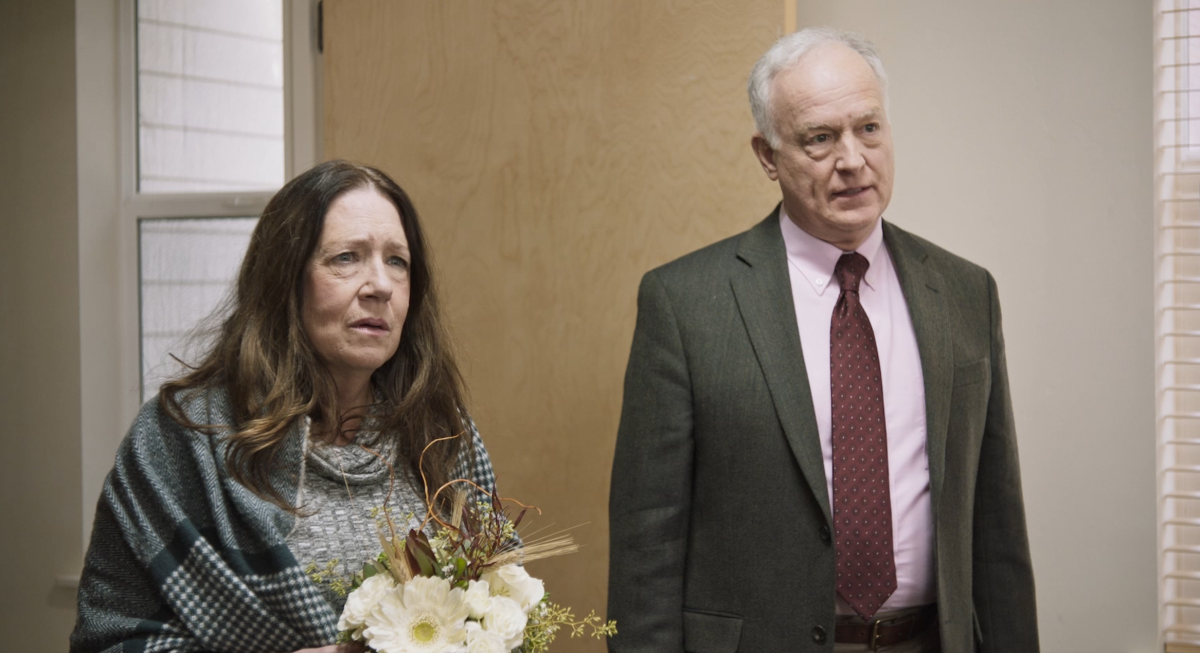
The four of them are left alone, but the camera stays with them, watching as they exchange hesitant greetings, share a few family mementoes and stumble their way into the anything-but-casual business at hand. All four choose their words carefully, perhaps too carefully; it’s hard to recall the last time you saw characters struggling so intently not to say the wrong thing in a situation where there is no hope of saying the right thing. We’re left to infer a lot of unexplained history: their painful past correspondence; cycles of legal complications and media frenzies; the end of Richard and Linda’s marriage. We also sense their reluctance to talk about something that they’ve spent years talking about and living with, that has become the very air they breathe.
From time to time the characters, slipping into the spare confines of Lindsey Moran’s production design and bathed in the soft, uncloying glow of Ryan Jackson-Healy’s images, seem to evoke real-life parents who’ve tried to turn tragedy into activism. That’s a word that Jay, an outspoken gun-control advocate, personally can’t stand, and Isaacs’ handsome but haggard face conveys the exhaustion of someone too accustomed to taking care of others at the expense of himself. You sense his protectiveness toward (and fear of) Gail, who’s initially the quietest of the four but seems to direct the conversation with her silences, her every glare and gesture charged with resentment in Plimpton’s lacerating performance.
Until Gail reaches her breaking point and the floodgates open, her reluctance to speak feels like a pointed rebuke to Linda, whose own emotions gush forth with comparative ease. Her instinctive empathy can be both heartrending and mildly annoying in a movie that invites you to adopt each character’s perspective in turn (an intention signaled by the precise, democratic rhythms of Yang-Hua Hu’s editing). But those perspectives themselves change over the course of the story, and Dowd, a virtuoso at turning on the waterworks, also knows precisely when to turn them off. By the end it’s her Linda who seems to speak most soberly and authoritatively for all of them, and who seems to have come the closest to moral clarity that any of them can.
At one point Linda echoes a line from the memoir of Sue Klebold , mother of the Columbine High School shooter Dylan Klebold, when she both critiques and defends her moral right to grieve, describing the undiminished depths of her love for the killer she raised. Richard stubbornly shares that love, even as his more defensive posture — he’s analytical and businesslike to a fault, and a little smug — threatens to thwart the viewer’s compassion. But if he’s the least overtly sympathetic of the four, the one the script relies on most heavily to nudge the drama toward conflict, Birney nonetheless strips him just as emotionally bare, revealing his detachment as its own private tragedy.
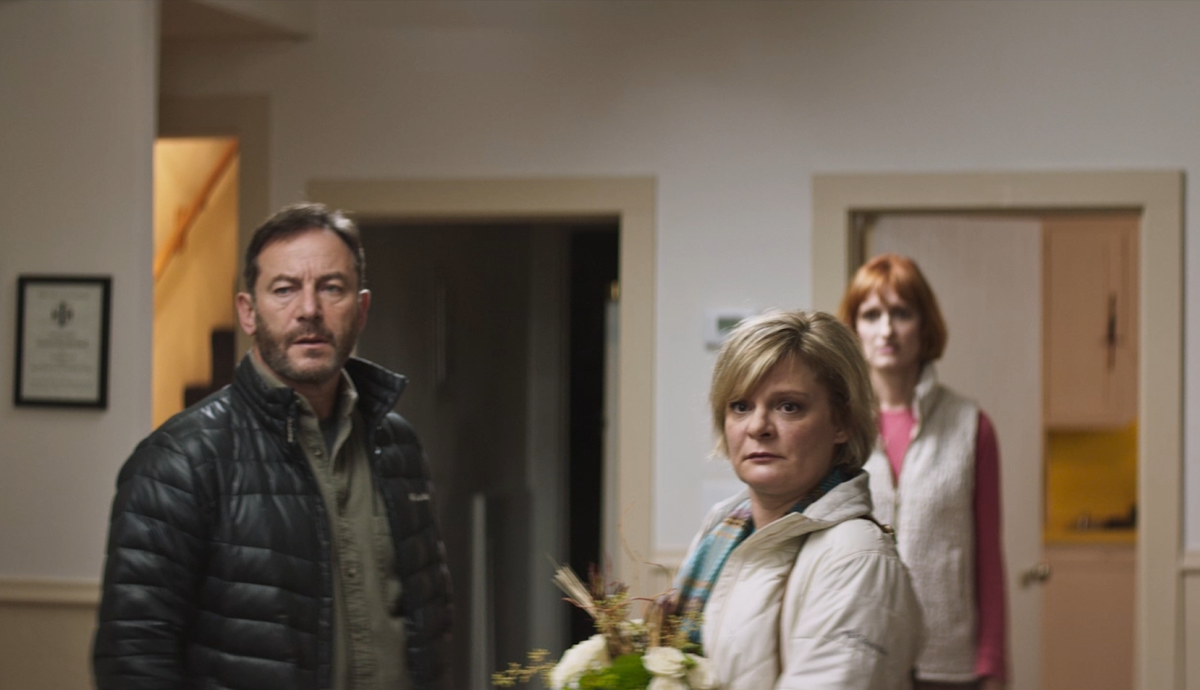
The balance of clashing perspectives and contradictory emotions is so finely calibrated throughout “Mass” as to stir your admiration and your suspicion alike. Kranz’s multitasking script must explore inner lives and parcel out narrative details, often in the same instance. The difficulty of that task becomes most evident when it comes time for the characters to verbally reconstruct the events of the shooting — an agonizing conversation whose power is dissipated, not heightened, by the suddenly agitated movements of the camera and a too-studied shift in aspect ratios. In these moments the movie seems to be trying to force an emotional reaction, to lurch for a catharsis that its characters know is desperately out of reach.
“Mass” is at its strongest when it shares in that knowledge, and when it calls into question the ritualistic gestures toward forgiveness and healing that Jay and Gail are moved to consider. They know words can comfort and soothe, no less than the hymn they hear a choir practicing in the distance. But this is, among other things, a vividly eloquent movie about the futility of language, its inability to represent the full scope of our intentions and experiences, much less exorcise our deepest pains.
At one moment Richard says, “You think you can attach one word to something to understand it, to make you feel safe.” There is some comfort to be gleaned within the cloistered silences of “Mass,” but also an implacable sorrow for four people — and the countless grieving women and men they represent — who will never know safety again.
Rated: PG-13, for thematic content and brief strong language Running time: 1 hour, 50 minutes Playing: Starts Oct. 8 at AMC Sunset 5, West Hollywood, and the Landmark, West Los Angeles
More to Read

An emotional Nava Mau explains why she ‘needed’ Netflix’s ‘Baby Reindeer’
Aug. 15, 2024

The 12 greatest movies from the shuttering Participant Media
June 14, 2024

Grief changes you. Michael Arceneaux is writing through it
March 6, 2024
Only good movies
Get the Indie Focus newsletter, Mark Olsen's weekly guide to the world of cinema.
You may occasionally receive promotional content from the Los Angeles Times.

Justin Chang was a film critic for the Los Angeles Times from 2016 to 2024. He won the 2024 Pulitzer Prize in criticism for work published in 2023. Chang is the author of the book “FilmCraft: Editing” and serves as chair of the National Society of Film Critics and secretary of the Los Angeles Film Critics Assn.
More From the Los Angeles Times
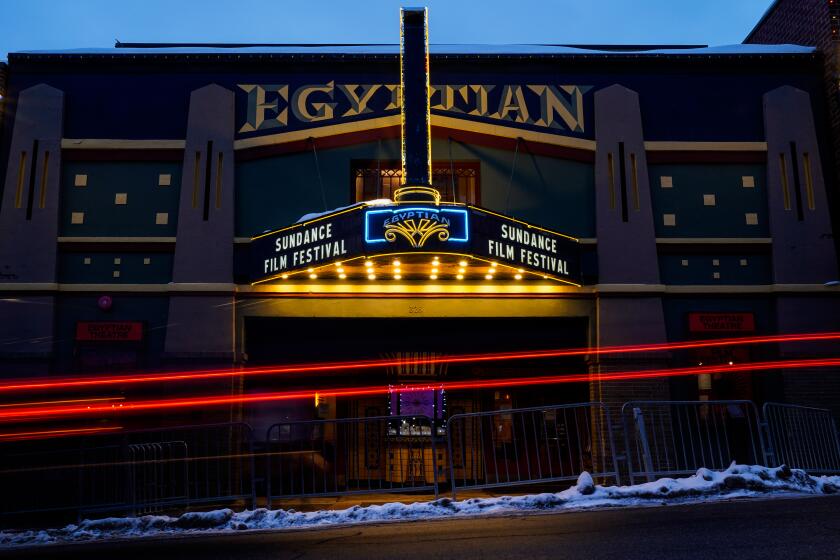
Here are the final six cities Sundance could move to in 2027
July 19, 2024
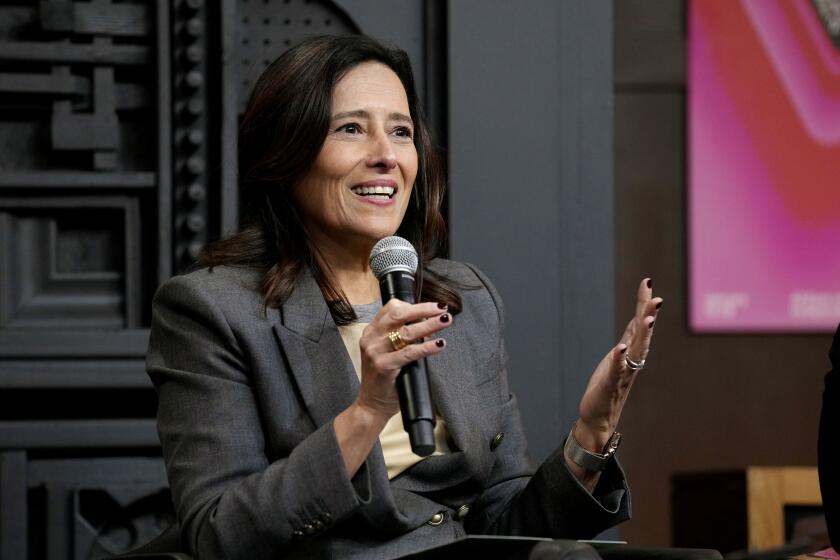
In surprise leadership shakeup, Sundance Institute CEO steps down after 2.5 years
March 22, 2024
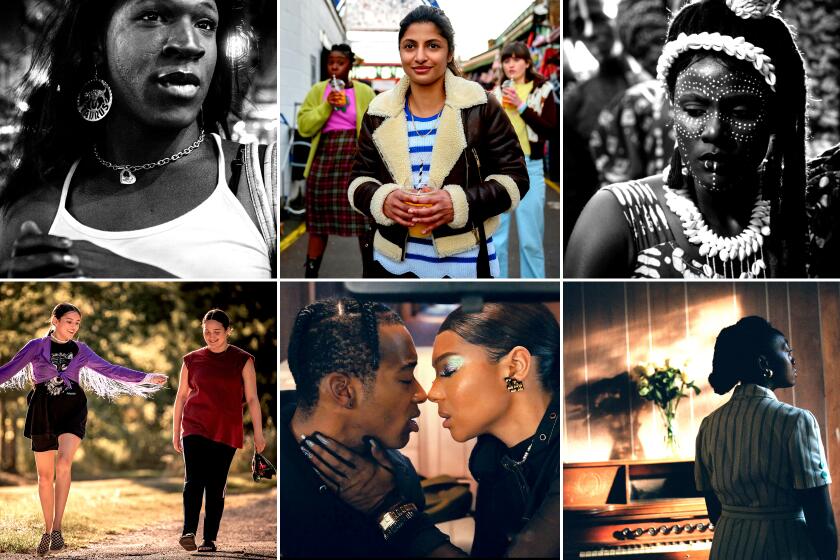
A year later, 7 festival filmmakers reflect on ‘the real-world payoff of Sundance’
Feb. 8, 2024

Everyone was feeling ‘A Real Pain’ at Sundance this year
Jan. 26, 2024

Most Read in Movies

Rashida Jones delivers the speech late father Quincy wrote to accept his honorary Oscar
Nov. 18, 2024
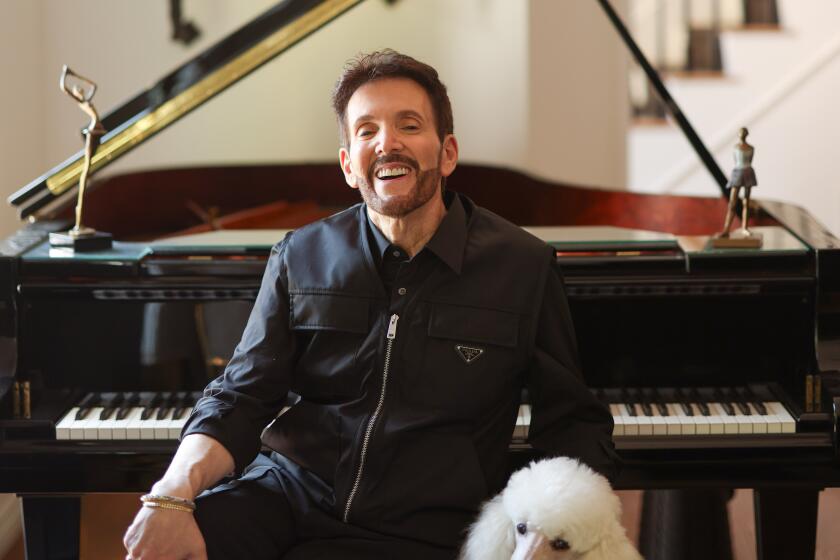
Column: Meet the voice coach who’s become a ‘spiritual guru’ to Hollywood’s biggest stars

At Telluride, ‘Conclave’ pleases, even if other Oscar hopefuls aren’t ready for prime time
Sept. 1, 2024
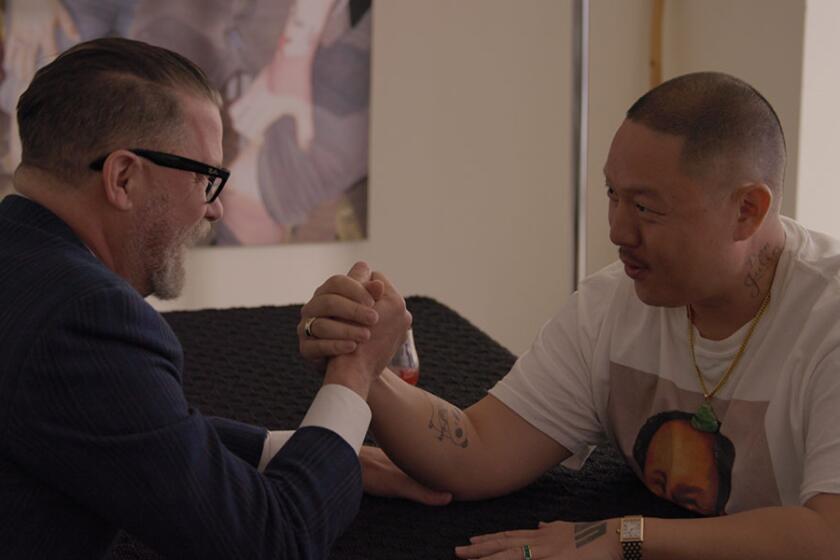
Hollywood backers of Vice were ‘investing in the ideas of a Nazi,’ says ex-employee Eddie Huang
Sept. 8, 2024
‘Mass’ Review: A Charged Meditation on the Aftermath of a School Shooting
The parents of the shooter meet the parents of a victim in a talk-therapy drama that packs a truthful punch.
By Owen Gleiberman
Owen Gleiberman
Chief Film Critic
- ‘The Bibi Files’ Review: A Powerful Exposé of How Benjamin Netanyahu Has Prolonged the War in Gaza to Escape His Own Corruption Scandal 11 hours ago
- ‘Gladiator II’ Review: Paul Mescal Is a Pensive Avenger in Ridley Scott’s Serviceable but Far From Great Sequel 1 week ago
- ‘Endurance’ Review: Ernest Shackleton’s 1914 Voyage to the Icy Bottom of the Earth Comes to Life in a You-Are-There Documentary 1 week ago

“ Mass ,” a drama that consists of two couples seated across a table from each other in a placidly sterile church antechamber, discussing the unthinkable (two of them are the parents of a teenage boy who was killed in a school shooting; the other two are the parents of the shooter), is a movie you could easily imagine having been a stage play. I don’t say that just for the obvious reasons (spare contained setting, characters who do nothing but talk, etc.). “Mass” was written and directed by Fran Kranz, who has never made a movie before but is a veteran actor, and he has crafted the dialogue so that it builds and flows and surges, revealing and concealing at the same time, drawing us to the center of its rhythms. There’s a special pleasure to be had in seeing actors engage in this kind of winding conversational back-and-forth, which on stage can seize and hold you the way music does.
Related Stories

One Year Later, ‘Call of Duty: Black Ops 6’ Legitimizes Microsoft-Activision Deal

Korea Box Office: 'Venom: The Last Dance' and 'Hear Me: Our Summer' Tied Over Quiet Weekend
What the medium of movies can add is a sense of voyeuristic intimacy, and that’s the quality that “Mass” has. It’s like a slow-burn group confession that’s also a debate, and it invites us to take a journey into the souls of all four of these people. Sitting with them in that room, we travel somewhere. “Mass” might be described as a talk-therapy thriller built out of memory — a psychodrama, a meditation, and benediction, all at the same time. On some level the film is undeniably a conceit; it takes a highly explosive situation and gives it the rounded contours of a 12-step catharsis. Yet the writing is so deft, and the actors so committed, that by the end you feel you’ve touched the burning core of something real.
Popular on Variety
I wouldn’t say that revealing the premise of “Mass” counts as a “spoiler,” but the way Kranz has designed the film, it takes a while to learn who these people are and why they’ve agreed to meet at a small Episcopal church, and there’s more to that delay than meets the eye. The hosts usher the participants into the anteroom with great care, as if they were preparing for a vital peace talk between two nations — and, in a sense, they are. And even if you do know the premise of the movie, it takes a bit of time to figure out which couple is which. That’s all quite intentional. “Mass,” among other things, is an inquiry into questions of guilt and innocence and the surprising ways they can overlap.
When an event as tragic, and horrific, as a school shooting takes place, our primal instinct — as individuals, as a society — is to want to know who or what to blame. How, after all, do we keep it from happening again? In recent years, however, the question of who or what to blame has been increasingly sucked up into the culture wars. The culprit is guns and gun laws! The culprit is mental illness! The culprit is first-person-shooter video games! The culprit is irresponsible parenting! All these issues are alluded to in “Mass,” but that doesn’t mean that it’s a movie about definitive answers — or politics.
The massacre the film is about took place six years before, and we’re given to understand that its aftermath played out on the overbright canvas of media, with all the parents hauled in front of the cameras, interviewed over and over again. Gail ( Martha Plimpton ) and Jay ( Jason Isaacs ), who lost their son in the violent attack (the weapons included not just guns but explosives), have been leaders of the aggrieved, and activists; what happened then now defines their lives. The anguish that can fade but can never die is etched onto their faces, but they introduce themselves to the officious Richard (Reed Birney) and the tremulous Linda ( Ann Dowd ), the parents of the shooter, by presenting them with a small bouquet, a kind of peace offering. These four, it’s implied, have traced one another for years and know all there is to know about the case. So what’s to be gained?
What Gail and Jay want, most of all, is to be able to look Richard and Linda in the eye and ask: Is there something, in hindsight, you knew about your son that should have been a red flag? Something you were in denial of? The boy was troubled, and this has been chronicled; he was bullied. Linda and Richard still disagree about whether they should have moved, taking him out of the woodland setting he loved and into a more suburban place. Yet their refrain, stated in various ways, is: We didn’t know. We couldn’t have known. There’s no way anyone in our position could have known . Gail and Jay don’t believe this, and in different ways — Jay angry and grandstanding, Gail ruled by a grief that thirsts for consolation — they hammer away.
Kranz has drawn forceful performances from all four actors. Plimpton shows you how the bitter, wrathful sting of recrimination can take over a gentle soul, and Isaacs seems to be ritually lacerating himself with a fury he can’t let go of. Birney, with his Midwest corporate blandness, strikes us as suspiciously detached until the scene in which he reveals that he holds the whole awful “choreography” of the shooting in his head, as if that could help him transcend it. And Dowd, in what may be the film’s richest performance, communicates something that seems subversive at first, until we begin to feel the sorrowful terror of it: that she, too, was victimized by who her son was.
What kind of an audience is there for a movie like “Mass”? Given the subject, maybe a modestly sized, intensely self-selective one. Yet the movie announces Fran Kranz as a bold new filmmaker who has earned the right to excavate a subject as sensitive as this one. In “Mass,” he peels away at it, holds it up to the light, and finally sees right into it. He makes a kind of moral promise to the audience, saying: If you don’t flinch, this film won’t either.
Reviewed at Digital Arts, Jan. 18, 2021. Running time: 110 MIN.
- Production: A 7 Eccles Street production. Producers: Fran Kranz, Casey Wilder Mott, J.P. Ouellette, Dylan Matlock. Executive producers: Joe Abrams, Nico Falls, Marshall Rawlings, Douglas Matejka.
- Crew: Director, screenplay: Fran Kranz. Camera: Ryan Jackson-Healy. Editor: Yang-Hua Hu. Music: Darren Morze.
- With: Martha Plimpton, Jason Isaacs, Ann Dowd, Reed Birney, Breeda Wool, Michelle N. Carter, Kagen Albright.
More from Variety

Sony PlayStation 5 Pro Is Available Now: Here’s Where To Get The New Console Online

The Great Cable Rollup That Will Never Be

Why ‘Horizon Adventures’ Team Nixed Lego’s ‘Mumble Mode’ for PlayStation Franchise’s Original Voice Cast

PlayStation Closes Firewalk Studios After Shutting Down ‘Concord’ Video Game

AI in Animation Is Not an All-or-Nothing Proposition
More from our brands, how timothée chalamet ‘pushed the bounds’ to play bob dylan in ‘a complete unknown’.

Car of the Week: This 1,018 HP Koenigsegg Prototype Could Fetch $2.3 Million at Auction

MLBPA Asks Court to Confirm Sanctions Against Player Agents

The Best Loofahs and Body Scrubbers, According to Dermatologists

Beyoncé to Perform at Halftime of Texans-Ravens Christmas NFL Game

Mass Review
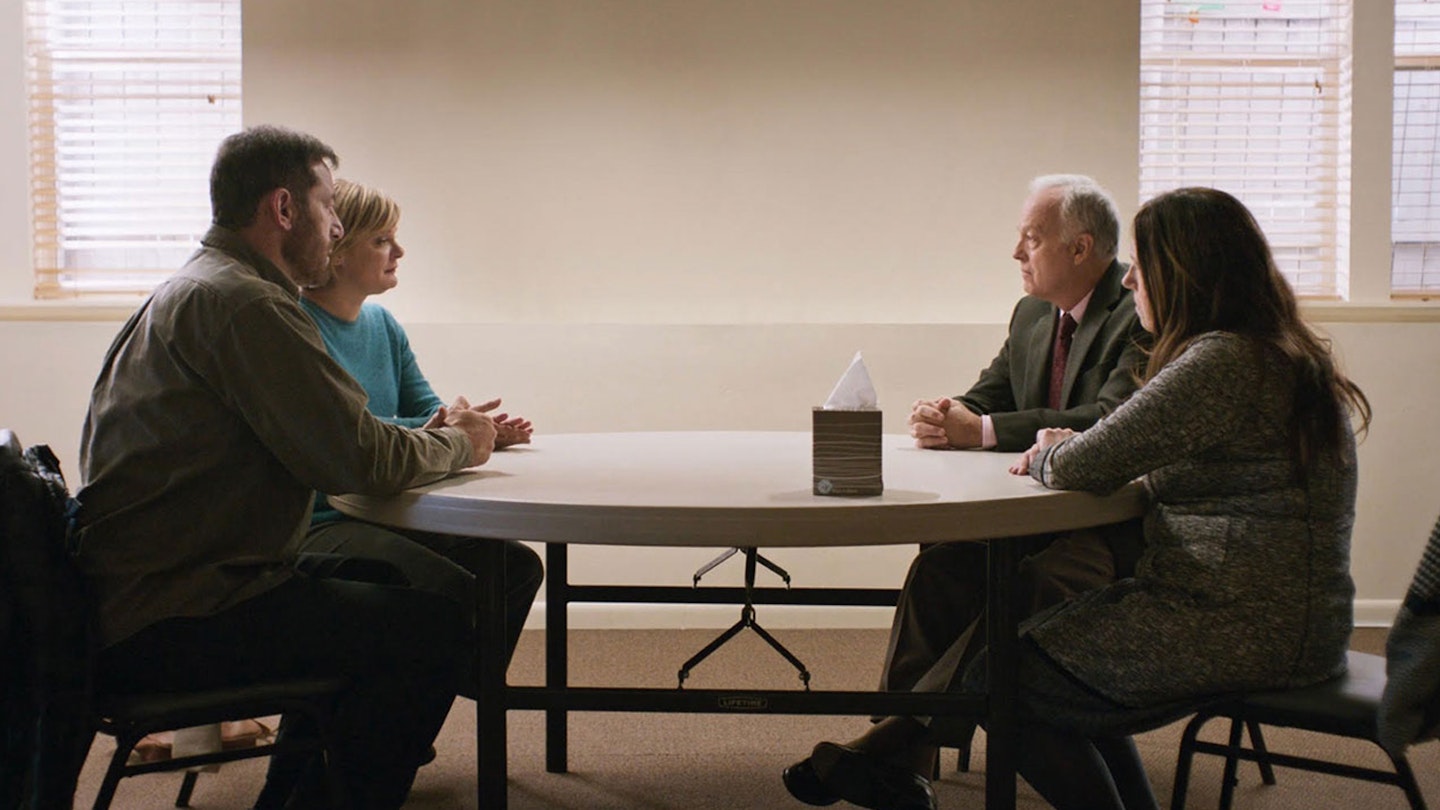
21 Jan 2022
From first-time writer-director Fran Kranz (yes, he of The Cabin In The Woods stoner-guy fame), Mass is an impressive four-actor chamber-piece that combines the relentless emotional intensity of theatre with a voyeuristic intimacy that’s specific to film. The result, a potent study in tension and release, offers an arresting examination of grief that suggests the only way to come to terms with the unspeakable is to talk through it.
Kranz’s film opens with Judy (Breeda Wool), a parishioner at a small Idahoan Episcopal church, fretfully setting up a meeting room in its antechamber with young helper Anthony (Kagen Albright). The arrival of coordinator Kendra (Michelle N. Carter) reveals two families will be attending, while her assessment of the venue’s suitability allows Kranz to deftly set the tone and define the space for the discussion that’s ahead. A playroom door is quietly closed; a stained-glass school project draws a protracted, “Ohh…”; four chairs at a table are quickly split into two pairs; a tissue box’s placement is scrutinised enough to suggest its necessity is inevitable. In these early moments, the stillness of cinematographer Ryan Jackson-Healy’s camera is striking — it’s as if everyone, including us, is holding their breath.
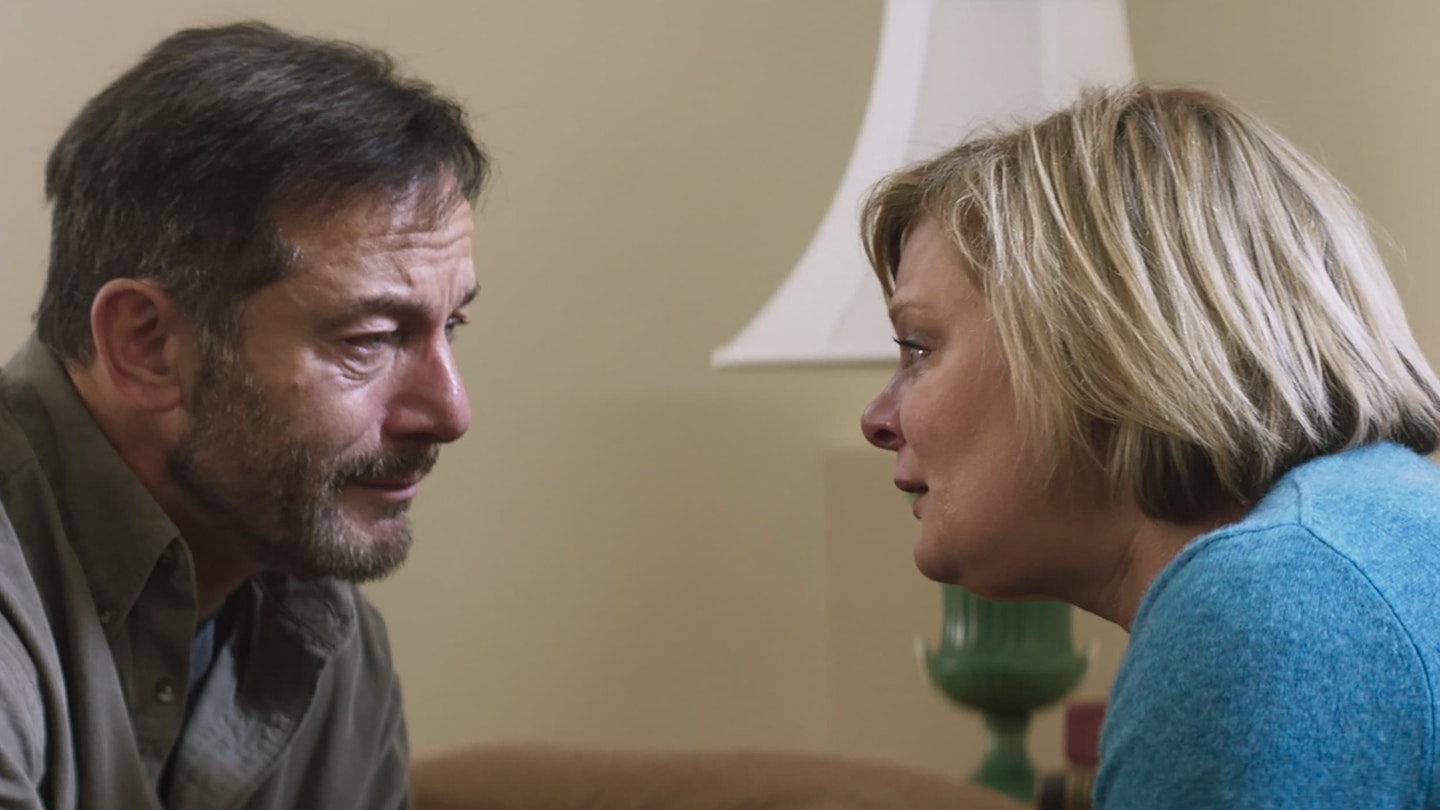
Before long, Jay ( Jason Isaacs ) and Gail ( Martha Plimpton ) arrive, followed by Linda ( Ann Dowd ) and Richard (Reed Birney). The tension between the families is palpable, augmented by Kranz and his ensemble’s nuanced orchestration of uncomfortable small talk, abyssal silences, and character-revealing gestures. Linda extends an olive branch with the gifting of a potted plant, and in return Gail wars with her empathetic impulses as she passive-aggressively offers tissues when Linda later starts crying. Richard tries to pitch himself as the diplomatic voice of reason, deploying wishy-washy double-negatives like, “I don’t disagree,” with alacrity in increasingly vain attempts to diffuse tension. Jay, meanwhile, continually has to keep himself in check with reminders of his therapist’s guidance.
Yang Hua Hu’s punchy editing makes an eruption feel inevitable, destabilising Jackson-Healy’s static camerawork with increasingly frenetic cuts between loaded lines and expectant glares as the elephant in the room becomes unavoidable entirely. Thirty-seven minutes into the film, having implicitly established that both families have lost a child in a school shooting, Gail bursts Mass ’ emotional dam — “Why do I want to know about your son? Because he killed mine.”
Kranz commits to staying in the room with these same-but-differently traumatised parents.
A lesser film might seek to embellish or sensationalise this revelation with a flashback, but Kranz commits to staying in the room with these same-but-differently traumatised parents for the 20 seconds of devastating silence that follow, and the hour of soul-searching that lays beyond that. Through the baring of all their rage, anguish, heartache and hollowness following the shooting (no punches are pulled, so proceed with caution), Kranz makes a clear point about the futility of trying to assign and deflect blame retrospectively. Instead, the filmmaker is more interested in pursuing restorative justice in the here and now, looking for something tangible his characters can reach, as painful as that process may be.
Kranz’s sensitive directorial approach and the insular setting create a safe space for this exercise, but it falls on the shoulders of the film’s four powerful leads to guide us through it. Jason Isaacs’ sullen-eyed and jaw-clenching performance as Jay, whose relentless activism and instinctual need to be strong for his wife is visibly crippling him, might well be his finest film work to date. Beside him, Martha Plimpton delicately handles her portrayal of a mother who yearns for release from her pain while fearing her son will be lost for good if she finds it. Opposite them, Reed Birney and Ann Dowd convey the torture of loving and grieving a murderer with tact and boundless empathy, their vulnerability — there from the start in Dowd’s empath Linda and gradually exposed in Birney’s more mannered Richard — opening the door to reconciliation. As the two families crest the waves of anger and argumentation, an aspect-ratio shift drives home the magnitude of the way their world has changed, the stagedness of their meeting dissolving as they move past the table, chairs, legal waivers and hypotheticals towards something approaching mercy.
By the time Jay and Gail, Linda and Richard go their separate ways, it feels as though they are leaving somehow lighter, certainly changed. And though the sheer heft and relentlessness of it all may be too much for some, Mass ’ moving story of hope, humanity and forgiveness found in the face of unimaginable tragedy lingers long after the fade to black.
- What Is Cinema?
Mass Is a Brilliantly Acted Look at a School Shooting’s Aftermath

Were the new film Mass (in limited theaters October 8) an off-Broadway play, something as searing and finely performed as it is would likely have become a mini sensation. Or, at least, it would have caught the eye of many culture vultures in search of bracingly intimate, and pertinent, theater. But it’s not a play: It’s a film vying for national attention amid the clamor of James Bond and other large scale amusements.
Which, ultimately, may be a good thing, if it can find an audience. In film form, Mass can potentially reach a wider swath of people than a play probably ever would, especially in parts of this country where it is perhaps most grimly relatable. The film, from writer-director Fran Kranz , concerns a school shooting, one of those all too common horrors that arrives entirely without warning. Or does it? That is, in some ways, the investigation of the film, which is about two sets of parents trying to sift through what happened, years after it did. Mass exists in the long tail of grief and in the persistent haunt of questions unanswered, and perhaps unanswerable.
It’s not a prurient wallow. Kranz’s writing, and the generous performances of his actors, tend toward grace and compassion; the film directly, urgently grapples with what may be salvable while gently giving space to what isn’t. The tricky conceit of the film is that one pair of parents—Linda ( Ann Dowd ) and Richard ( Reed Birney )—raised the boy who did the shooting. They are, after much official mediation, meeting with the parents, Gail ( Martha Plimpton ) and Jay ( Jason Isaacs ), of one of those killed. Their tentative interaction maneuvers between confrontation and shared lament, staged as one long, almost real-time conversation as this shattered quartet tries to reach an ineffable understanding.
Minus some bordering scenes, the bulk of the film takes place in the church rec room where the parents have agreed to meet. The film is fixed in that one drab place, rooted there even as Kranz’s camera subtly, nimbly moves around the actors. That cramped interiority could easily create something starchy and inert, a pretentious muddle that can’t survive under such a close gaze. But Kranz, an actor making his writing and directing debut, keeps the conversation compelling. It sounds strange to say of a film about such impossible sorrow, but Mass is thoroughly entertaining. Or maybe engrossing is a better word. Its incisive dialogue and nuanced performances demand our attention, inviting us into a roiling weather system of guilt and sadness. The experience proves oddly nourishing, clarifying.
As the parents of the boy, Hayden, who killed 9 classmates and one teacher before turning his gun on himself, Dowd and Birney embody different but complementary ideas of how such a thing might be processed. Richard has his prickly defenses about the care and attention Hayden received before it all went wrong, while Linda is more willing to explore the gray areas of Hayden’s character. But Richard also readily admits that he “failed,” while Linda won’t really let herself identify, or at least express, any concrete mistakes. They are a jumble of contradictions and agonized-over histories, just as most people are. Birney and Dowd sensitively illustrate the tension between confusion and certitude, their willingness and their weariness in responding to questions they’ve asked themselves a thousand times.
There are moments in Mass when one might wonder how “realistic” it is that these characters speak in such eloquent paragraphs. But the reality is probably that parents like these would have gone over these matters night after night, year after year. This meeting is meant to give formalized shape to what they’ve learned or come to understand in all that intervening time. Their deliberate, careful phrasing has been long in development. Even in one heartrending moment when Gail is asked to tell an impromptu story about her son, Evan, you can see her rifling through the file of well-worn anecdotes and picking a poignant, simple favorite. These people are all too well-versed in their grief.
In that scene, if you can call any specific point in the film a scene, Plimpton does extraordinary things, as she does throughout. She and Isaacs, showing facets of his ability I’ve not seen before, have a natural rapport, playing a couple that has stuck together through the ruin and now, with bone-deep exhaustion, are ready to make some kind of peace with what happened. Has that been achieved by the end? In some ways, yes. The kin of the killer and of the killed form a tentative, maybe fleeting bond in their mutual loss. But Kranz is also wise enough to suggest that some psychological wounds are irreparable, while others could come creeping out of dormancy at any point in these characters’ future.
Mass does offer some solace, though. And there is the exhilaration of its precise execution, its sober competency, its eschewing of sermon and sanctimony. Kranz briefly touches on issues like gun control before turning back inward, letting the political hover at the edges but never too easily coloring the specific motivations of these four distinct people. He employs a crucial restraint, which allows his sterling actors to elucidate huge emotion without also having to prove some didactic point. Thoughtful and harrowing, Mass is a difficult wonder. I’d still like to see it on stage someday. For now, I’ll urge you all to go see the movie.
— Cover Story: Regina King Is in Her Element — Even on Film, Dear Evan Hansen Can’t Fix the Musical’s Main Problem — Linda Tripp’s Daughter Wishes Her Mom Was Around to See Impeachment: American Crime Story — Unlucky Star: The Brief, Bombastic Life of Rudolph Valentino — Emmys 2021 Winners: See the Full List Here — LuLaRich ’s Derryl on Taking Down LuLaRoe and Boycotting Kelly Clarkson — What Michaela Coel Did With I May Destroy You Is Bigger Than the Emmys — Love Is a Crime : Inside One of Hollywood’s Wildest Scandals — Dune Gets Lost in Space — From the Archive: The Making of Ghostbusters — Sign up for the “HWD Daily” newsletter for must-read industry and awards coverage—plus a special weekly edition of “Awards Insider.”
Richard Lawson
Chief critic.

The Definitive Voice of Entertainment News
Subscribe for full access to The Hollywood Reporter
site categories
‘mass’: film review | sundance 2021.
Jason Isaacs, Martha Plimpton, Ann Dowd and Reed Birney play the respective parents of one of the victims and the perpetrator of a school shooting in a face-to-face encounter in Fran Kranz's chamber drama.
By David Rooney
David Rooney
Chief Film Critic
- Share on Facebook
- Share to Flipboard
- Send an Email
- Show additional share options
- Share on LinkedIn
- Share on Pinterest
- Share on Reddit
- Share on Tumblr
- Share on Whats App
- Print the Article
- Post a Comment

Debuting writer-director Fran Kranz ‘s years as an actor show in the powerful performances he draws from his tight ensemble in Mass , a drama of searing intimacy that trades the political for the personal in its reflections on gun violence and mental health. With laser focus and unflinching emotional candor, the film approaches the seemingly unending horror of school shootings in America from the viewpoint of devastated parents on both sides of the tragedy, six years later. It’s a harrowing watch, but a cathartic one, with each of the four superb principal actors delivering scenes of wrenching release.
In addition to his career in film and television (he was part of the unofficial Joss Whedon repertory company in Dollhouse , The Cabin in the Woods and Much Ado About Nothing ), Kranz has notched up solid theater credits, including the Mike Nichols-directed Broadway revival of Death of a Salesman led by Philip Seymour Hoffman and Andrew Garfield. His no-frills first feature could very easily have been a play, though Kranz applies minimal stylistic embellishments to give visual life to the predominantly single-setting, talk-driven piece.
Venue : Sundance Film Festival (Premieres) Release date : Friday, Oct. 8 Cast : Jason Isaacs, Ann Dowd, Martha Plimpton, Reed Birney, Breeda Wool, Michelle N. Carter, Kagen Albright Director-screenwriter : Fran Kranz
Most of the action takes place around a table in a downstairs room for community group use at a small Episcopal church; it was shot in Hailey, Idaho, though the town is unnamed in the script. Parish workers Judy (Breeda Wool) and Anthony (Kagen Albright) get busy arranging a table and chairs, and setting out snacks and beverages before the arrival of strictly-business social worker Kendra (Michelle N. Carter), who surveys the setup for potential triggers. These secondary figures then retreat as the movie becomes fundamentally a four-hander.
Tension in the car between one couple, Gail ( Martha Plimpton ) and Jay ( Jason Isaacs ), indicates the fortitude required of them just to come this far. Gail’s terse manner and a few half-choked words reveal that she’s still unsure whether she can go through with the carefully planned meeting. Jay’s sorrowful eyes settle on a red ribbon tied to a barbed wire fence on the edge of a field backed by mountains. That image recurs later to striking effect as the aspect ratio widens to indicate a shift in the perspective of four people previously locked in their own chambers of grief.
The awkwardness in the room is palpable when Richard (Reed Birney) and Linda ( Ann Dowd ) arrive, despite polite small talk about the drive to get there and the arrangement of flowers Linda has made for Gail. Unsure of how to proceed with a subject still too painful to discuss, they resort to methods suggested in advance by Kendra, such as sharing photographs. But it’s not long before tightly wound Gail bristles at the artificial pleasantries.
Kranz’s screenplay parcels out details with unhurried economy, allowing us to piece together specifics about the death of Gail and Jay’s son in an attack involving explosives and firearms, carried out with unsparing cruelty by the son of Richard and Linda before taking his own life.
Related Stories
Sundance: neon takes animated doc 'flee' for north america.
While Jay has become involved in the campaign against gun violence in what would appear to have been a desperate urge to fill the void, Richard is defensive, attempting to shift the discussion to inadequacies in the mental health care provided both by the school and by therapists who treated his son. His gray business suit and stiff formality make it no surprise that Richard and the more earnest, touchy-feely Linda have since separated, even if he’s frank about blaming himself.
The history of their son as a victim of bullying, friendless and increasingly isolated, finding escape in online video game roleplay, emerges not as justification but as acknowledgement of alarming signs his parents admit they should have monitored more closely. But there’s genuine compassion, particularly in Dowd’s performance, for the helplessness of a mother watching her child become more withdrawn and struggling to reach him.
It’s almost an hour into the film before voices are raised, a testament to how meticulously Kranz and his cast calibrate the emotional temperature in the room. DP Ryan Jackson-Healy’s camera moves gracefully back and forth among the four participants, clocking every connecting glance or averted gaze, as Gail and Jay struggle to stick to Kendra’s guidelines of expressing their feelings without being vindictive. Only when shredded nerves give way to heated outbursts does the frame tighten in on them, with movement becoming more agitated.
The most confrontational of the four — and the emotional center of the drama — is Gail, and Plimpton’s open wound of a performance is a reminder that she’s one of America’s most undervalued actors. (Her New York stage work across dramas, musicals and comedies consistently dazzles.) Gail’s anger has festered inside her since the tragedy, with no place to go, and some of the film’s most affecting moments involve the flickers of realization across her face as she admits to herself that any answer she demands won’t lessen her loss. Even more piercing is her gradual awareness of the commensurate pain suffered by the parents sitting opposite her, and her tearful recollection of a lovely story from when her late son was 12 is heartbreaking.
Isaacs is unexpected casting for Jay, who’s strong yet sensitive, with no trace of malice; watching him break as he voices his own needs, quite distinct from Gail’s, is extremely moving. While Richard thinks of his son’s hate as the product of a disturbed mind, Jay sees only apathy and evil. It’s the steady softening of feelings that have been hardened into him and Gail that makes their reserves of tenderness so shattering.
Birney, another invaluable regular of the New York stage community, has possibly the toughest part, Richard having somewhat compartmentalized his pain without ever finding relief from his sense of responsibility. But like all four leads, his disclosures cut deep. And Dowd as always impresses as a woman who continues to dredge down into her soul to interrogate herself on how she could have raised a murderer, yet refuses to stop loving her dead son. She gets the film’s resonant concluding speech when Linda returns to share one final mournful memory after the two couples have said their goodbyes.
Kranz has made a quiet, contemplative film on a subject of ongoing national urgency. Mass is most notable for its refusal to indulge in breast-beating theatrics, instead favoring psychological complexity and human connection as it tests the boundaries of forgiveness and understanding. The church setting aside, the film’s spirituality is understated — glimpsed in the framed Sistine Chapel detail hanging on one wall of the stark meeting room or in the face of Judy as she witnesses the final scene, and heard in the sounds of a hymn sung during choir practice over the closing moments.
Full credits
Venue: Sundance Film Festival (Premieres) Production company: 7 Eccles Street Distribution: Bleecker Street Cast: Jason Isaacs, Ann Dowd, Martha Plimpton, Reed Birney, Breeda Wool, Michelle N. Carter, Kagen Albright Director-screenwriter: Fran Kranz Producers: Fran Kranz, Casey Wilder Mott, J.P. Ouellette, Dylan Matlock Executive producers: Joe Abrams, Nico Falls, Marshall Rawlings, Douglas Matejka Director of photography: Ryan Jackson-Healy Production designers: Lindsey Moran, Mia Lyon Cherp Costume designer: Michele Minailo Music: Darren Morze Editor: Yang-Hua Hu Casting: Henry Russell Bergstein, Allison Estrin Sales: CAA/Gersh
THR Newsletters
Sign up for THR news straight to your inbox every day
More from The Hollywood Reporter
Michael mann’s ‘heat’ set for red sea film festival treasures program, governors awards: oscar hopefuls pack room as bond producers, richard curtis, juliet taylor and the late quincy jones are honored, pierce brosnan on becoming a 92-year-old vet for ‘last rifleman’ and the latest about ‘mamma mia 3’, does the length of a festival standing ovation really matter, hollywood flashback: ‘the cardinal’ drew high praise at the golden globes in 1964, hollywood flashback: how oliver stone made ‘alexander’ not so great.
How to Have an Impossible Conversation
The events in Mass are spurred by a school shooting, but the film’s true focus is the challenge of talking through grief.

For the first 40 minutes of its runtime, the film Mass refuses to reveal why its four protagonists—two sets of parents—have gathered in a small room in a church basement. They don’t appear to be friends; they’re polite toward one another, but cold. They’re not there to pray or to eat the food that’s been provided. Their conversation is stilted and awkward, descending into silence every few beats.
Finally Gail, played by Martha Plimpton, clarifies their situation. She squeezes the words out, as if desperate to hold them in but incapable of doing so any longer: “Why do I want to know about your son?” she asks. “Because he killed mine.”
Mass , which is now in theaters, is about the lasting trauma spurred by a school shooting that happened years before. Linda (played by Ann Dowd) and Richard (Reed Birney) are the parents of the shooter; Gail and Jay (Jason Isaacs), the parents of a victim. But the film doesn’t dwell on the tragedy that took their sons. It doesn’t indulge in flashbacks, never shows the two boys, and rarely moves outside the sunlit but stifling room. Instead the drama rests in the quartet’s private discussion, an attempt by all parties to move forward , whatever that means.
The writer-director Fran Kranz blocks Mass , his first film, like a stage play. Inspired by true stories about parents of shooters meeting parents of victims, as well as the Truth and Reconciliation Commission, in South Africa, Kranz delivers a delicately paced study not of a school shooting and its aftermath, but of the way people communicate grief. The conversation, which plays out in real time, captures the second-to-second emotional evolution of dealing with unfathomable loss: Their hesitancy to touch the subject of their sons’ deaths bubbles into geysers of vulnerability that they then try to quell. They struggle to modulate their expressions of pain and guilt, especially when their personal conclusions about the event haven’t crystallized as much as they thought—and perhaps never will.
In brewing such precise discomfort, Kranz forces the audience to concentrate deeply on what’s being said and, more important, unsaid. The characters, played meticulously by four top-of-the-line actors, all believe they understand why they’re there: Gail and Jay want more clarity, and, as they repeatedly insist, “to heal”; Linda and Richard feel it’s their responsibility to provide answers. But their exchange doesn’t unspool so neatly. Jay’s gun-control activism hides a buried anger. Linda’s obvious yearning for forgiveness—she offers Gail a handmade bouquet as a gift as soon as she enters the room—betrays her fear, while Richard’s matter-of-fact demeanor covers up a guilt he can’t shake.
This isn’t the typical approach for a school-shooting movie, an unfortunate subgenre born of America’s real-life crises. Recent films that use a school shooting as a backdrop, such as Lakewood and Run Hide Fight , focus primarily on the violence and horror. Others, such as Vox Lux and the Oscar-winning animated short film If Anything Happens I Love You , concentrate on the painful aftermath for survivors and relatives. The current creative impulse, it seems, is to lean into either the drama of the shooting or of its impact; anything else would be too messy.
Mass ’s unusual approach—to consider how people communicate with one another—results in the rare dramatization of a school shooting’s lasting effects that feels truthful without being exploitative. That choice also helps the film resonate beyond its particular tragedy. The close examination of a single conversation shows the frustratingly familiar rhythms in discussions about other sensitive subjects, for instance. Self-editing phrases—“I’m just saying,” “It’s just,” “What I mean is”—pepper the dialogue; the characters are searching for the right words where there are none. In some scenes, they talk past one another, too eager to share their perspectives first. Midway through the film, Jay delivers a monologue about his memory of visiting the school after the shooting that gains speed like a runaway train. It obviously stings Linda and Richard, and the conversation shuts down. In moments like these, Mass understands how the inability to compassionately discuss grief perpetuates it. Yet both couples manage to continue talking, showing the value of empathy.
During a panel I moderated for The Atlantic Festival, Isaacs and Dowd briefly debated whether their film is about a school shooting at all. To Isaacs, it’s not, but Dowd disagreed. Looking back, I think they’re both right: Mass wouldn’t work without the event that led its foursome into that small church room, but its message—that the simple act of talking about trauma is an often overlooked step toward healing—also transcends its specific tragedy.
Watch: Atlantic staff writer Shirley Li in conversation with Ann Dowd, Jason Isaacs, and Fran Kranz
About the Author

More Stories
Jimmy O. Yang Was Stuck Playing Asian Stereotypes. Then Everything Changed.
A Film Impossible to Have Mild Feelings About

IMAGES
COMMENTS
October 8, 2021. 6 min read. An out-of-nowhere triumph, "Mass" is the sort of American drama that you rarely see anymore: an intimate four-character piece about the aftermath of a school shooting that unfolds mostly in one room, letting a powerhouse cast and a thoughtful script carry much of the burden of meaning.
Years after an unspeakable tragedy tore their lives apart, two sets of parents (Jason Isaacs and Martha Plimpton, Reed Birney and Ann Dowd) agree to talk privately in an attempt to move forward.
The movie lacks the gut punch of live theater, the thrill or discomfort of watching people show their feelings in real time. But as cinema, it demonstrates the effectiveness of simplicity. A well ...
Jan 24, 2022. Mass - it's raw pain like this that I've seen/felt before. It's an "actors movie" and I honestly forgot they were acting. Every tear, outburst, and voice crack felt and sounded real. And yes, I cried, a lot. Ann Dowd, Jason Isaacs, Martha Plimpton, and Reed Birney were all out of this world. It's cold and haunting in its approach ...
Review: 'Mass' powerfully explores the emotional aftermath of a school shooting. Two sets of parents meet for an intensely painful reckoning after a high school shooting, in "Mass.". From ...
Crew: Director, screenplay: Fran Kranz. Camera: Ryan Jackson-Healy. Editor: Yang-Hua Hu. Music: Darren Morze. With: Martha Plimpton, Jason Isaacs, Ann Dowd, Reed Birney, Breeda Wool, Michelle N ...
Release Date: 21 Jan 2022. Original Title: Mass. From first-time writer-director Fran Kranz (yes, he of The Cabin In The Woods stoner-guy fame), Mass is an impressive four-actor chamber-piece that ...
Were the new film Mass (in limited theaters October 8) an off-Broadway play, something as searing and finely performed as it is would likely have become a mini sensation. Or, at least, it would ...
Mass. The Bottom Line An uneasy communion. Venue: Sundance Film Festival (Premieres) Release date: Friday, Oct. 8. Cast: Jason Isaacs, Ann Dowd, Martha Plimpton, Reed Birney, Breeda Wool, Michelle ...
Bleecker Street. October 11, 2021. For the first 40 minutes of its runtime, the film Mass refuses to reveal why its four protagonists—two sets of parents—have gathered in a small room in a ...